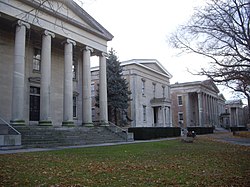Sailors' Snug Harbor
|
Sailors' Snug Harbor
|
|

"Temple Row"
|
|
| Location | 914–1000 Richmond Terrace, Staten Island, New York City, New York |
|---|---|
| Coordinates | 40°38′33″N 74°6′10″W / 40.64250°N 74.10278°WCoordinates: 40°38′33″N 74°6′10″W / 40.64250°N 74.10278°W |
| Built | 1831, opened 1833 |
| Architect | Martin E. Thompson; Minard Lafever |
| Architectural style | Greek Revival, Late Victorian |
| NRHP Reference # | 72000909 |
| Significant dates | |
| Added to NRHP | March 16, 1972 |
| Designated NHLD | December 8, 1976 |
Sailors' Snug Harbor, also known as Sailors Snug Harbor or Snug Harbor Cultural Center and Botanical Garden or, informally, Snug Harbor, is a collection of architecturally significant 19th-century buildings set in an 83-acre park along the Kill Van Kull on the north shore of Staten Island in New York City, United States. It was once a home for aged sailors. Some of the buildings and the grounds are used by arts organizations under the umbrella of the Snug Harbor Cultural Center and Botanical Garden.
Sailors' Snug Harbor includes 26 Greek Revival, Beaux Arts, Italianate and Victorian style buildings. The site is considered Staten Island's "crown jewel" and "an incomparable remnant of New York's 19th-century seafaring past." It is a National Historic Landmark District.
Snug Harbor was founded through a bequest after the death of Revolutionary War soldier and ship master Captain Robert Richard Randall, namesake of the nearby neighborhood of Randall Manor. Randall left his country estate in Manhattan, bounded by Fifth Avenue, Broadway, 10th Street, and the southern side of 8th Street adjacent to what is now Washington Square, to build an institution to care for "aged, decrepit and worn-out" seamen. Randall's disappointed heirs contested the will extensively, delaying the opening of the sailors' home for decades. By the time the will challenge was settled, the once-rural land around the Manhattan estate had become well-developed. Snug Harbor's trustees (appointed by Randall's will, they included the mayor of New York City, the president and vice president of the Marine Society, senior ministers of the Episcopal and Presbyterian Churches, the head of the Chamber of Commerce, and the chancellor of the State) decided to maximize the profits on the Manhattan property. They changed the proposed site of the institution to another piece of land bequeathed by Randall: a 130-acre plot on Staten Island overlooking the Kill Van Kull.
...
Wikipedia



